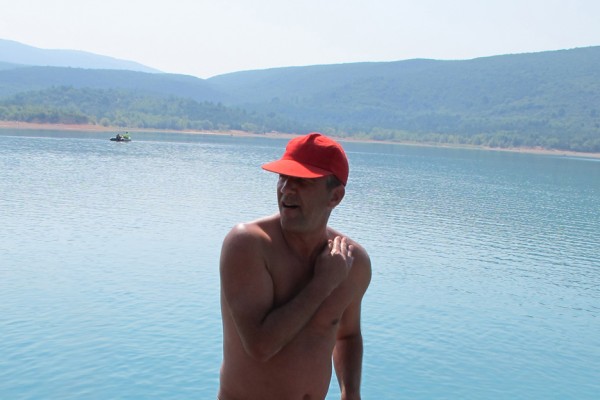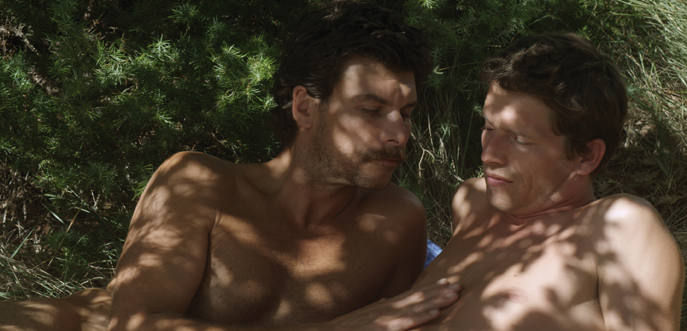
Mr. Guiraudie on location at the lake
In conversation with the director Alan Guiraudie
The Stranger by The Lake director on cruising, censorship & cum shots.
Cruising, cum shots, and murder most foul — there’s quite a lot going on in Stranger By The Lake, and that’s only the first 30 minutes. Alain Guiraudie’s latest film, for which he won Best Director in the Un Certain Regard section at the 2013 Cannes Film Festival, is much like the body of water in its title — serene and quiet on the surface, yet hiding mysterious and murky depths underneath.
This French film follows Franck, a handsome gay man who begins visiting a secluded nudist lake where men spend long hours cruising one another by the water, or (as a result) wandering into the condom-strewn woods for anonymous sex. At first he befriends Henri, a chubby loner who simply visits the lake to watch, but his attention immediately turns to the porn-stached Michel. He’s a total babe, but it seems he has a boyfriend.
Late one afternoon, while returning from an uncomfortable hook-up in the woods, Franck secretly witnesses Michel drown his boyfriend in the lake. However Franck’s infatuation seemingly outweighs the “crazed killer” alarm bells in his head, and he spends the next few days with Michel, quickly falling in love. When the body is found, a policeman begins questioning the men around the lake, while Henri makes futile attempts to warn Franck of the danger he’s putting himself in.
This is a film about the silent rituals of cruising, the illusion of appearance, but most of all about the allure of danger. While very likeable, we know nearly nothing about the character of Franck, and it is implied that there is perhaps nothing worth knowing. Is his life so empty that risking death, through his knowing dalliance with a murderer, is the only thing that makes him feel alive? With this modern noir story, Guiraudie puts the perilous facets of gay culture under the microscope. In a world of NSA hookups and Grindr house-calls, is risk part of attraction and lust?
Yet there is no judgement in the film’s depiction of these men and their rituals. Often showing the action from an objective distance, the camera never leaves the lake. This creates a solipsistic home for the anonymity of cruising — best exemplified by the police inspector who can’t understand how these men can be so intimate and yet not even know each other’s names. And yet at some points the film almost feels allegorical; when Franck requests Michel not to use a condom, its hard not to relate his flirtation with a murderer to the risk of barebacking.
 Christophe Paou and Pierre Deladonchamps
Christophe Paou and Pierre Deladonchamps
 Pierre Deladonchamps and Patrick d’Assumçao
Pierre Deladonchamps and Patrick d’Assumçao
Stranger By The Lake feels like a Hitchcockian thriller at times, turning the lake’s open expanses into a quietly claustrophobic setting. Totally devoid of music, the only soundtrack is the gently lapping water or the wind whipping through the woods. The handsome lead actors play their dangerous infatuation perfectly, but it is Patrick d’Assumçao as Henri who really shines as the voyeuristic friend grappling with his own sexuality.
The film is exquisitely shot, and while plenty will talk about the unsimulated sex scenes, it’s the final moments that will divide audiences — and leave you questioning the value of danger and sex in modern gay life. We were fortunate enough to sit down with the director Alain Guiraudie at Lincoln Center to ask him a few pointed questions, via a translator, here is what he had to say:
Can you talk about the setting of the film, why do we never leave the lake? I think the idea was to have the action take place in a public place, and its a public place where we see them. We never see them at home, we never see them in a restaurant, they are always in this public place. The only time perhaps is when we see Franck (Pierre Deladonchamps) arrive in his car, in the parking lot but its still always in this same place. I think it’s important not to see them elsewhere because of what this does, it enables us to really bring the film from the dimension of the everyday and the ordinary, to another dimension, to something that’s just a little bit beyond that, and we are able to do that because we are constantly in the one location.
What year was this film meant to be set? I really like it when people ask me this question about when my film has taken place, because the film for the most part is taking place today, yet as it is in a lot of my works, there is also a presence of the 1970’s. So it’s really a kind of mixture because in the film you have Michel (Christophe Paou) who looks like somebody from the 70’s and some of the cars from the parking lot also look like cars that could have been straight out of the 70’s. So there’s kind of a blending of the 70’s and the present, which really gives the film a timelessness, which is what I like.
How did you find the location? It’s inspired by a lake that was close to where I live, a place I was very familiar with, but I wanted to find the same kind of lake but in a place that had a lot more sun. So I actually found the lake that you see in the film, it’s the sunniest location that I found.
Can you describe your casting process? The process for casting in this film was pretty similar to the one I’ve used in all of my films. I always use a casting director, in this film I used a new casting director I hadn’t worked with before but we proceeded in the same way that we had before. The casting director showed me hundreds of photos to look at, it was more than 500 photos. Once we had made a decision on which ones we wanted to meet with and go more in depth with, I met with them. I would have them do some tests, both reading tests and physical to see if they were who I was looking for. The casting director and I would do this together and based on that, we made our decision.
A lot of Gay films never show a cumshot unless they’re porn, why did you make the choice to include it? The reason why I wanted to show the sex in the film, is for that very reason. I didn’t want it to be left only to pornagraphic films, to show gay sex. We have a tendency to look at film as being in two different camps. You have the great films, that are the great romantic stories, where everything is love and romance and you have the pornographic films where everything is dirty but you see all the sex. What I wanted to do was to show that sex was something that’s very important. It’s very important in our lives, it’s very important in love, and what I wanted to do was to have a film where these two things, the love and the sex were brought together in the same film. It was almost a political decision to do that.
Was the sex real in the film? No, the main actors in the film never have sex together and the non simulated sex in the film was done with actors who were body doubles.
What was the inspiration for the fashion styling in the film? It’s funny because in a sense it could almost be a nudist film, but we really looked very hard at the costumes, we worked a great deal to get them right. Basically what we did with the person who was responsible for the costumes was go shopping. We would go to flea markets and would look for things. Then we had the actors try them all on to see what worked and what didn’t. It was partly something that was theoretical in a sense of what we wanted, but I think there was a large intuitive side to it, like what looked right and worked. Basically, what I meant when I said theoretical, was that we said we really can’t dress them in the stereotypical gay looking clothes— anything that would immediately identify them as gay. We wanted to avoid those stereotypes.
Can you name some directors that you were influenced by for this project? Very indirectly there is of course Charles Walton, there’s Alfred Hitchcock, Pedro Almodovar, Nanni Moretti. These were indirect influences on the film. But two more direct influences on me, is the Chinese film The Ditch and the Thai director of Uncle Boonmee [Who Can Recall His Past Lives], Apichatpong Weerasethakul. The reason why I say those, especially Uncle Boonmee and why they were direct influences is because of the way they use light and shadow. That was how they were direct influences on this film.
The film is a very accurate portrayal of what these men were doing, have you ever cruised in the woods before? It’s a world that I know very well.
Were you ever concerned about the censorship of the film? No, that wasn’t a concern for us, except for the website of the New York Times where they showed a little clip — it’s on the Internet, so the scene was cut and the film isn’t on iTunes because if it was, the more pornographic scenes would have to be cut out. Actually maybe not, I’m not really sure about that.
Stranger by The Lake is now playing at The Film Society of Lincoln Center & The IFC Center in NYC. It opens on February 7th in San Francisco; on February 21st in Chicago and Boston; On March 7th in Seattle, Minneapolis, Denver and Washington D.C.; On March 14th in Philadelphia, Atlanta and San Diego.